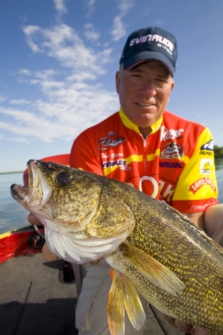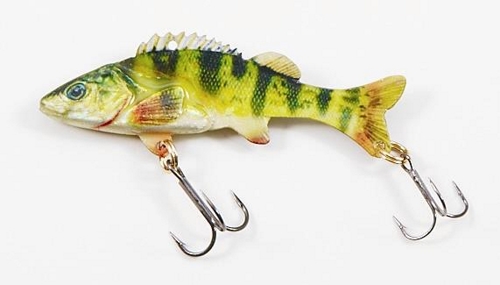Blade Bait Resurgence
Category: article
Apr 4th, 2011 by OutdoorsFIRST
Modified Apr 4th, 2011 at 12:00 AM
Water clarity can be such an important variable that affects our success regardless the time of year. Walleye and sauger both can be affected by poor visibility. On rivers in particular when heavy rains or sudden run off can dirty the water and create poor visibility, anglers have to make the adjustments if they expect to catch fish. Whenever conditions create turbulence and suspend particles in the water where you can’t see the prop of an outboard motor, remember that the window in which fish can see your presentation is much narrower. The fish can’t see the presentation coming near them and have little time to respond. Typically, muddy or turbid water can create difficult fishing conditions and success often drops off until the water clears up. With a few adjustments and the proper lures however, some walleye anglers have a knack of putting fish in the boat during some difficult conditions.
 |
|
|
Evinrude pro, Eric Olson uses blade baits extensively to catch enormous walleye and sauger.
|
Blade baits are a favorite presentation for tackling rivers when the visibility is poor. Traditional lures include Heddon Sonars, Gay Blades, Bullet Blades and Cicadas. While these lures are classics that have been around for decades, a new lure that cuts the current, really puts out a hard vibration and catches a lot of walleye and sauger is the Northland Tackle Live Forage Minnow Trap. Blade baits emit such a nice hard vibration and fish seem to really key in on the vibration. When worked properly, the vibration is so distinct that you can even tell when the treble hook is fouled up with debris.
Blade Baits work best over a clean bottom when vertically jigging them on river systems. Contacting the bottom sporadically is often necessary. Many anglers aggressively rip these baits but too high of a lift or snap often seems to be less productive for me and sometimes results in a lot of snagged fish. When slipping slowly downstream, a jig stroke that is very effective for me is to snap the lure in about a half foot window, just enough to feel two to four vibrations. This short stroke seems to keep the lure right in front of the fish where they can feel and find the lure. Most of the strikes happen as the blade bait coasts back to the bottom. Another key is to chase the lure with the rod tip as the lure drops. Keep the line tight on the snap and drop. This seems to keep the blade bait upright and out of snags more so and bite detection is much better.
A very deadly tactic that I feel helps me catch a lot more walleyes is to use a heavier blade bait. If for example is takes a ½ ounce blade bait to slip down stream with the current, try upsizing to a once ounce lure. The heavier lure allows you to slip slower and takes some of the arch out of the line created by the current and the heavier lure can also be slowly dragged upstream. Typically, I will slip down stream with this presentation but when I hit a pod of fish, I can power back up over the top of the fish and hold against the current, slowly snapping the blade bait back up through the fish. By being able to move with or against the current, I am allowed a longer window of opportunity to put fish in the boat when we find fish that are snapping.
 |
|
|
Blade Baits like the Live Forage Minnow Trap made by Northland Tackle are extremely deadly for walleye and sauger on river systems. |
Where legal, anglers can fish two rods and the easiest way to run two jigging rods with blade baits is to use bait casting rods and reels. A bait casting reel with a flipping switch can be handled with one hand. Adjust for deeper water or faster current by flipping the switch to let out line and bring in line by wrapping your fingers around the bottom of the rod handle so that you can spin the handle with your finger tips. With left and right handed reels, you can hold a rod in each hand and maintain bottom contact. A sensitive graphite blank that is five to six and a half feet in length with a medium fast action is perfect when spooled with Suffix Stretch Braid.
Blade baits are incredibly effective for walleye and sauger on river systems for most of the season but these baits really shine when high water or run off creates poor visibility. While the jig stroke and cadence can be experimented with, the key is to often find that hard short stroke that pumps the lure along the bottom. You want to send out a vibration yet keep the lure in front of the fish. Once you become comfortable with this presentation, blade baits can be an incredible tool for helping you catch more fish.
Editors Note: Eric Olson is a touring pro on the FLW Walleye Tour. In 2010, Eric Olson won the FLW Lake Oahe event and is considered one of the most consistent anglers on the tour.